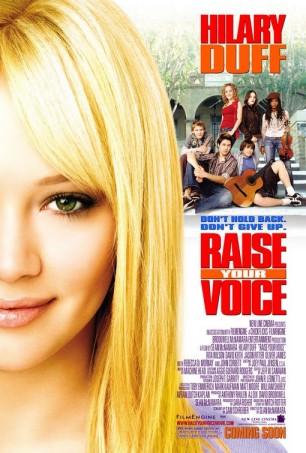|
Raise
Your Voice Are
you Duff enough? Well, are you?
Those
who are will be out in force this weekend in support of
ex-Lizzie McGuire star Hillary Duff latest film,
Raise Your Voice.
This time out,
Duff stars as Terri Fletcher, a small town girl whose life
consists of music, friends, her brother, and going to school
at Riverdale High in Flagstaff, Arizona.
A member
of the choir, Duff surprisingly never stands apart from
the crowd performance-wise. Instead, she blends into the
group, complementing the choral arrangement of Three Dog
Night's “Joy to the World” throughout the opening
sequence
Her
center stage status takes place mostly in her personal life.
Her brother Paul (Jason Ritter), a recent high school graduate
set to begin college at Arizona State, lavishes her with
his attention almost to a level that feels just plain wrong.
Following her around the house with his handheld video camera,
Paul videotapes her impromptu concerts, singing to herself
while brushing her hair in front of the mirror and so on.
We learn
that Terri has ambitions to apply for a summer music program
in the big scary metropolis that is Los Angeles. Along with
Paul, Terri’s mother Frances (Rita Wilson) and aunt
Nina (Rebecca De Mornay) both support her dream, but her
father Simon (David Keith) has reservations. In
what could be one of the most wooden performances in history,
Keith grits his teeth and moans about the potential corruption
of his daughter should she attend the program. He puts his
foot down, as do all fathers in teen movies about dreams
and discovery.
Paul’s
defense of Terri leads to him being grounded, so that night
he decides to edit together a video that will insure that
she get accepted into the performing arts academy summer
program.
Many teen “coming
of age” films suffer from the same tired clichés,
as do many reviews of teen “coming of age” films.
This one, however, seems to walk the thin line between the
credible and the contrived.
A night of celebration
with her brother causes Terri to lose all of the joy she
found in art. She no longer sings and seems content waiting
tables in her father’s diner, rather than dream of
a future in her music.
There is, of
course, the tiny matter of Paul’s secret video. Terri
is accepted to the program, and her mother and aunt decide
to mislead her father into letting her “stay”
with Nina in Palm Desert for the summer while she secretly
attends the academy in hopes of winning the $10,000 scholarship
they award one student each summer.
So let’s
run through the checklist: 1) A small town girl with talent
and a dream to rise above her small town roots, 2) A disapproving
parent that needs to be won over, 3) A fish out of water
tail.
So far
we seem to be in familiar territory. The thing is, Duff
never falls victim to the trappings of the teen genre. Sure,
there is newfound romance and new obstacles to overcome
in the process, but Sam Schrieber’s script plays fair
throughout.
Navigating
through tests such as sight-reading sheet music, performance
anxiety, and moody classroom rivals, Terri turns to the
few new friends she encounters, and her eccentric Music
Teacher (John Corbett) for inspiration and reassurance.
The
academy is like a musical zoo. The halls are filled with
musicians who always seem to be either wielding a musical
instrument or writing their next opus. Lunchtime consists
of students sitting in a quad, jamming in unison. The irony
is that their “jam session” lacks the spontaneity
of on the spot music making as the music they make feels
so…well, written.
Though given a list of rules that the students must abide
by, after Principal Garrison (James Avery) introduces them
to the students, neither the rules nor the principal are
seen or heard from again until the final presentations at
the end of the film.
There
is a turning point midway through the film, in which the
thematic threads are exposed enough to reveal the underlying
message holding the film together. This is expressed via
motivation from Terri’s new beau Jay (Oliver James)
who encourages her to forget her troubled past, the strains
of fitting in, and winning the scholarship and just focus
on doing what you are there to do: finding what you came
to find.
This
pits music as an art of expression rather than a ticket
out of small town life, or a steppingstone to success. The
film has every opportunity to fall into the easy route of
success and glamour, but Director Sean McNamara carefully
sidesteps these plot mines. In the end, we are still witness
to tired clichés and enough schmaltz to coat a wedding
cake, but the result seems to work on a genuine level somehow.
In an
age of marketed teenage sexuality and pop superstardom at
the age of twelve, Raise Your Voice instead offers
messages showing that one need not offer up their sexuality
to gain acceptance without beating them over the audiences’
head.
Terri’s
final performance on stage provides the emotional closure
she so desires, but does not stand out as an exceptional
showcase of Duff’s range as a vocalist. In fact, the
whole thing feels far too canned and produced to be a legit
live performance, but it gets the job done.
There
are touches that make the film work, and there are others
that drive it into the ground. Fans of music as an art form
will delight with the attention paid to the creative process
and the difficulty of learn to read sheet music. They will
also cringe at the misuse of instruments and blatant lack
of skill the actors exhibit at times as they pretend to
play their instruments. Try to unearth the French horn in
Terri and Jay’s final performance, then question why
the band member with said instrument seems to be playing
it with such fervor.
Rating:

|






